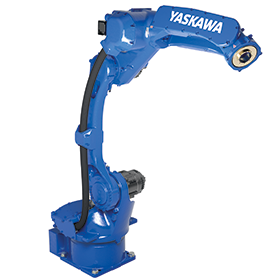

National sales manager for Yaskawa Southern Africa, Jan T’Hart shares his insights on the future of automation in this country, highlighting the trends set to redefine manufacturing. Yaskawa’s vision for the new year includes technological advancements, industry-specific needs, and a commitment to sustainability.
Emerging technologies and innovations
Yaskawa expects that continued advancements in AI, especially in machine learning and deep learning, will enhance the capabilities of robots, especially with respect to perception, decision making, and adaptability to dynamic environments. Edge computing will also play a role. Processing data closer to the source can reduce latency and improve real-time decision making for robots. This is particularly important in applications like autonomous vehicles and drones.
Human-robot collaboration
Collaborative robotics (cobots) and safety technologies enable closer interaction between humans and robots in shared workspaces. With these advancements, South Africa’s manufacturing sector can expect a seamless integration of humans and robots in the future, fostering productive and efficient working environments. “This is particularly relevant in manufacturing and healthcare settings,” he says.
Advanced sensing technologies
In 2024, increased use of innovations in sensor technologies such as Light Detection and Ranging (LiDAR) and radar, and also improved computer vision, will enhance the perception capabilities of robots. According to T’Hart, this is crucial for navigation, object recognition, and interaction with the environment.

AI and machine learning
Yaskawa recognises the transformative role of AI and machine learning in enhancing perception, adaptive decision making, predictive maintenance and task automation for robots. These align with South Africa’s goal of using intelligent automation to boost its productivity and competitiveness in a rapidly changing global landscape.
Autonomous robotics
To keep up with forthcoming trends in automation, T’Hart emphasises that Yaskawa, like many other companies in the industry, will embrace the principles of Industry 4.0. This involves the integration of digital technologies and data analytics to create smart and connected manufacturing systems. Additionally, Yaskawa’s exploration of autonomous navigation, Simultaneous Localisation And Mapping (SLAM) technology and AI-based decision making will keep it at the forefront of autonomy trends. This will help meet the growing demand for autonomous solutions in South Africa, so that machines can operate with increasing independence.
Security and safety measures
When it comes to safety and security, the company adheres to industry safety standards and regulations relevant to the robotics sector. “Yaskawa’s comprehensive approach to security encompasses safety standards, advanced sensors, safe collaboration, access control, network security and thorough risk assessments. “This robust strategy addresses the need for secure and safe robotic systems in South Africa, especially in sensitive sectors where reliability is paramount,” explains T’Hart. “Collision avoidance systems are crucial for preventing accidents and ensuring the safety of both the robotic system and human operators. Yaskawa will continue investing in technologies and design principles that facilitate safe human-robot collaboration. This includes developing cobots with features like force limiting and speed monitoring to ensure that robots can work alongside humans without posing a danger.”
Sustainability measures
In response to the increasing drive for sustainability, Yaskawa places great emphasis on energy-efficient design, regenerative braking, low-power standby modes, material selection, recycling and efficient production processes. These reflect South Africa’s commitment to environmental responsibility, and the company takes a holistic approach to minimising the ecological footprint of robotic systems.
Industry-specific trends
“COVID-19 accelerated the adoption of contactless technologies. For example, in the workplace, robots are now deployed to perform tasks that traditionally involved human contact, such as cleaning, disinfecting, and material handling. They are equipped with more advanced sensors and vision systems, and are employed to maintain person/machine distance in manufacturing and assembly lines. In essence, these robots can adapt their movements based on the proximity of human workers,” explains T’Hart.
Strategic collaborations
T’Hart explains that collaborations with research institutions, universities and colleges can provide access to cutting-edge research and talent. Yaskawa works with its academic partners to stay informed about the latest developments in robotics, and to contribute to the advancement of the field. By collaborating with companies that specialise in artificial intelligence, computer vision, and edge computing, Yaskawa can integrate the latest technologies into its solutions.
As Yaskawa charts a course through the landscape of robotics in South Africa, its vision extends beyond mere innovation. The company aims to be not only a thought leader, but also a strategic partner that can facilitate the transition of South African industries into a future where robotics and automation redefine the possibilities.
| Tel: | +27 11 608 3182 |
| Email: | |
| www: | www.yaskawa.za.com |
| Articles: | More information and articles about Yaskawa Southern Africa |
© Technews Publishing (Pty) Ltd | All Rights Reserved